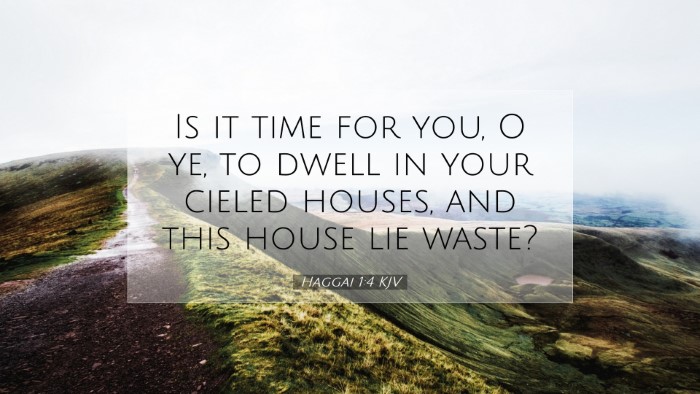Old Testament
Genesis Exodus Leviticus Numbers Deuteronomy Joshua Judges Ruth 1 Samuel 2 Samuel 1 Kings 2 Kings 1 Chronicles 2 Chronicles Ezra Nehemiah Esther Job Psalms Proverbs Ecclesiastes Song of Solomon Isaiah Jeremiah Lamentations Ezekiel Daniel Hosea Joel Amos Obadiah Jonah Micah Nahum Habakkuk Zephaniah Haggai Zechariah MalachiHaggai 1:4
Haggai 1:4 KJV
Is it time for you, O ye, to dwell in your cieled houses, and this house lie waste?
Haggai 1:4 Bible Commentary
Commentary on Haggai 1:4
Haggai 1:4 states: "Is it a time for you, O ye, to dwell in your ceiled houses, and this house lie waste?" This verse invites profound reflection on priorities concerning God's house versus personal comforts. The prophetic question raises crucial themes for pastoral and scholarly discussion.
Contextual Background
The Book of Haggai emerges in a post-exilic context, specifically during the second year of King Darius' reign (520 B.C). The Israelites, having returned from Babylonian captivity, faced the task of rebuilding the temple. However, they had become preoccupied with their own dwellings, neglecting the rebuilding of God's house.
Theological Implications
This inquiry from God through Haggai not only highlights the dissonance between personal and communal responsibilities but also unearths broader theological implications regarding stewardship, worship, and divine presence. The neglected temple signifies a neglect of God’s priorities, suggesting a spiritual malaise within the community.
Analyzing the Question
Haggai's rhetorical question challenges the complacency of the returned exiles: the term "is it a time for you" suggests a focus on self-interest and personal gratification while the divine purpose remains unattended. It's an indictment of their priorities.
- Personal Comfort vs. God's Command: The phrase "this house lie waste" points to the desecration of the temple, which symbolizes God’s presence among His people.
- Materialism: The ceiled houses represent a focus on material prosperity. The commentary by Albert Barnes emphasizes the human tendency to seek comfort first, often at the cost of spiritual obligations.
Insights from Matthew Henry
Matthew Henry highlights that Haggai makes it clear that the people had shifted their priorities. He notes:
"When we make ourselves easy in our own affairs, while the affairs of God lie waste, we are guilty of a great sin."
Henry suggests that this verse serves as a call to self-examination for believers today. Are we too focused on our own lives to the neglect of our spiritual duties? This reflects not only on individual believers but the church as a whole.
Perspective from Adam Clarke
Adam Clarke expresses that the question posed by Haggai serves to awaken the people from their spiritual lethargy. He elaborates:
"This question is designed to stir the conscience of the people and to bring them back to the awareness of their spiritual obligations."
Clarke emphasizes that spiritual progress is hindered when material pursuits overshadow divine mandates. Thus, Haggai’s words resonate significantly in contemporary contexts where distractions abound.
Applicability for Today’s Church
The echo of Haggai 1:4 serves as a clarion call to modern believers and church leaders. In a world rife with distractions, it beckons the church to assess its priorities, to ensure that temporal concerns do not eclipse the eternal demands of God.
- Revival of Priorities: The church must regularly evaluate how resources and time are spent in relation to God’s work.
- Community Engagement: There is a need for communal awareness—just as the Israelites needed to collectively refocus on the temple, the church must also collectively focus on God’s mission.
- Personal Reflection: Individually, believers must ask themselves if their lives reflect the priorities of God’s kingdom.
Conclusion
In summary, Haggai 1:4 is not merely a historical narrative but a profound theological challenge that beckons believers to evaluate the congruence of their lives with God’s priorities. The reflections from Matthew Henry, Albert Barnes, and Adam Clarke illuminate the timeless relevance of this verse, urging a responsive and responsible faith. It is essential for theologians, pastors, and laypersons alike to grapple with its implications for both individual and communal spiritual health.


